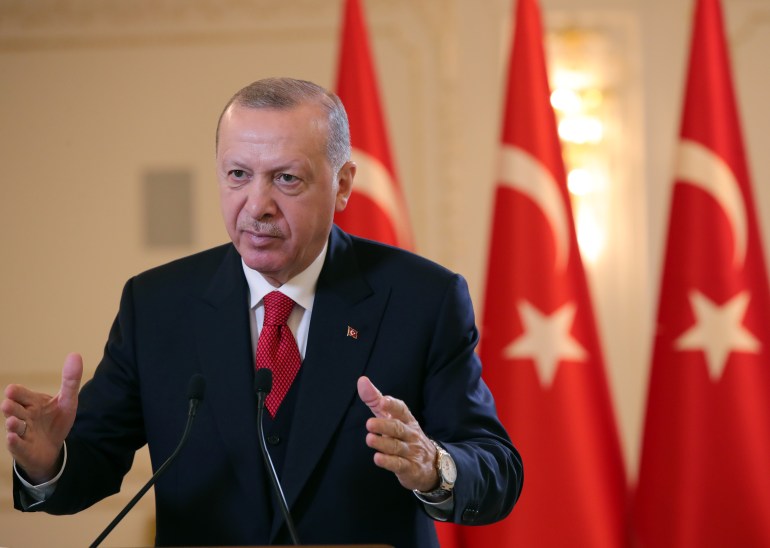Fitch Ratings placed optimistic forecasts for the Turkish economy this year, with the start of getting vaccines to prevent the outbreak of the Corona pandemic.
The agency's forecasts indicate that the Turkish economy will return to growth of around 3.5% in 2021, supported by an acceleration in the pace of local economic activity, starting from the second half of 2021.
The local economy was affected during 2020 due to the negative pressures resulting from the outbreak of the Corona pandemic, and the tourism wheel was halted due to international health restrictions, and the decline in global consumption demand.
Douglas Winslow, the chief analyst for Turkey at Fitch Ratings, said that the start of the Corona vaccination and the reduction of restrictions and measures to combat the pandemic will lead to an acceleration of the Turkish economy in the second half of this year.
In an interview with Anadolu Agency, Winslow indicated that "vaccination supports confidence, and that reducing restrictions imposed with the acceleration of economic recovery in Europe will lead to an acceleration of growth in Turkey by 3.5% during 2021."
He added that the agency will adjust its forecast for the growth of the Turkish economy in the "World Economic Outlook" report, which will be issued by next March.
Two months ago, Erdogan announced that his government had launched new economic reforms and called on investors to trust them and make investments in the country (Anadolu Agency)
Current account deficit
With the resumption of activity in the tourism sector later in 2021 and the resumption of export activity, the international official explained that a decline will occur in the current account deficit to 3.5% of GDP during the current year.
The Turkish current account deficit recorded 5.2% of GDP in the first 11 months of last year, with the deficit reaching 2.4% in 2022, according to the same source.
Monetary policies
Regarding the tough monetary policies of the new head of the Turkish central bank, the official at Fitch said that it will encourage moderate capital flows to the domestic market.
The Turkish Central Bank is currently implementing strict monetary policies, in an attempt to reduce inflation rates to less than 10%, and to re-strengthen the Turkish lira against foreign exchange after fluctuation during 2020.
These policies support Turkey's external financing balance, but compared to the large external financing requirements, we do not expect a significant increase in foreign exchange reserves in the short term, the same source confirms.
He said that the central bank's determination to increase interest rates and increase predictability are a step towards increasing the credibility of monetary policy, indicating that this will take some time.
He expected that the inflation rate in Turkey will decrease during the current year by 10.5%, and 9.5% in 2022, compared to expectations that inflation will exceed 11.5% during 2020.
He said that the Turkish Central Bank’s strong support for its monetary policy during last summer and the high level of loans in public banks contributed to the increase in the gross domestic product during the third quarter.
a future vision
Winslow explained that the elements that can positively affect the future outlook and the degree of Turkey's credit rating are reducing the inflation rate in a sustainable manner, and rebuilding the credibility of monetary policy.
He stressed the need to increase confidence in the sustainability of Turkey's external financing, increase domestic savings, reduce "dollarization" (converting domestic cash into foreign), and reduce dependence on loans and external borrowing in order to increase growth.
The World Bank revised its forecast on the growth of the Turkish economy for the year 2020 in its report issued on January 5 this year, expecting it to achieve a growth of 0.5%, instead of its previous expectations of a contraction of 3.8%.
The report stated that the Turkish economy will achieve growth of 4.5% in 2021, and 5% in 2022.
And last November, Turkish President Recep Tayyip Erdogan announced that his government had launched new economic reforms, calling on local and international investors to trust them and pump investments.
Erdogan said that a new phase had been launched aimed at achieving economic stability and increasing growth and employment, adding, "We have started an era of new reforms in the economic and legal levels."
The announcement of the new economic reforms was preceded by President Erdogan's signature of a decree appointing former Minister Lotfi Alwan to be Minister of Treasury and Finance to succeed Baraat Albayrak, and Naji Agbal as governor of the Central Bank to succeed Murad Uisal.

